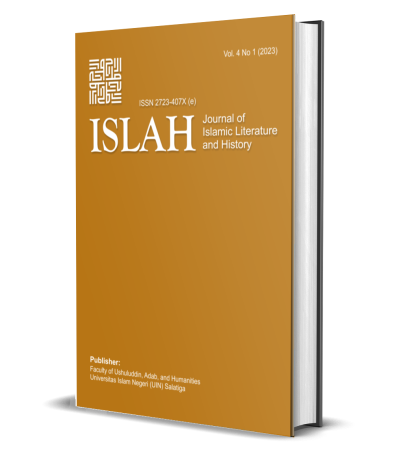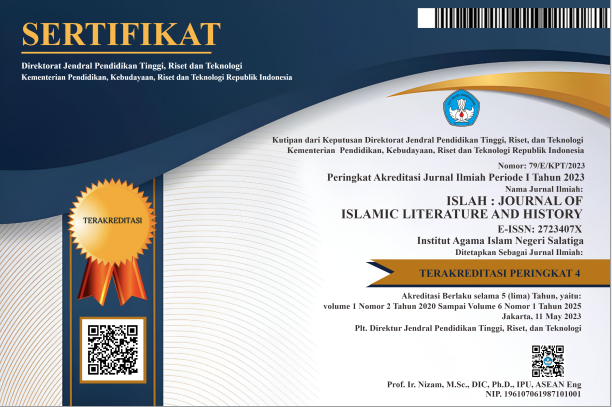The Role of Islamic Education in Shaping National Morality
A Literature Review
DOI:
https://doi.org/10.18326/islah.v5i2.161-170Keywords:
Islamic Education, National Morality, Character Building, Religious Principles, Ethical ValuesAbstract
Islamic education plays a crucial role in shaping the moral fabric of society by instilling ethical values and religious principles. This study aims to explore how Islamic education influences national morality through a systematic review of relevant literature. It examines the historical development of Islamic education, its methodologies, and its alignment with character-building frameworks. Furthermore, the review highlights key case studies demonstrating the effectiveness of Islamic education in fostering integrity, empathy, and social responsibility. The findings suggest that an integrative approach to Islamic education can significantly enhance moral standards at both individual and societal levels. This paper concludes with recommendations for optimizing educational strategies to better contribute to the moral development of the nation. The study underscores the importance of collaboration between educators, policymakers, and religious institutions in achieving these goals.
References
Abidin, Z. (2021). “Curriculum Reform in Islamic Education,” Asian Journal of Education, 40(1), 30-45.
Ahmad, K. (2018). Tarbiyah in Islamic Education: Principles and Practices. New York: Routledge.
Ahmad, S. (2018). "Curriculum Variability and Moral Education in Islamic Schools." Education and Society Review, 23(4), 78-92.
Al-Attas, M. N. (2001). Islamic Education: Its Aims and Objectives. Kuala Lumpur: International Institute of Islamic Thought.
Al-Attas, S. M. N. (2019). The Concept of Education in Islam. Kuala Lumpur: ISTAC Press.
Al-Ghazali, A. (2003). The Alchemy of Happiness. New York: Islamic Book Trust.
Ali, S. (2022). “Digital Innovations in Islamic Education,” Journal of Educational Technology, 58(1), 88-102.
Al-Qaradawi, Y. (1996). The Role of Knowledge in Islamic Morality. Cairo: Dar Al-Shuruq.
Aziz, I. (2020). “Teacher Training in Islamic Education,” Contemporary Issues in Education Research, 13(4), 211-224.
Ehteshami, A. (2015). Globalization and Islamic Education: Navigating Contemporary Challenges. Oxford University Press.
Esposito, J. L., & Voll, J. O. (2020). Islam and Democracy. Oxford: Oxford University Press.
Farooq, M. (2021). "International Collaborations in Islamic Education: A Path Forward." Global Education Review, 9(1), 45-58.
Halstead, J. M. (2020). “An Islamic Concept of Education,” Comparative Education, 36(4), 512-522.
Hassan, M. (2020). “Challenges in Islamic Teacher Training Programs,” Educational Review, 72(1), 85-102.
Kamali, M. H. (2007). "Tarbiyah: The Islamic Approach to Education." Islamic Studies Journal, 46(2), 25-45.
Kamali, M. H. (2019). Moderation in Islam: A Conceptual Framework. Kuala Lumpur: IAIS Malaysia.
Khan, A. (2019). “Policy-Making in Islamic Education,” Educational Policy Journal, 45(3), 312-329.
Nasir, M. (2021). “The Role of Islamic Stories in Character Building,” Journal of Islamic Studies, 28(3), 245-260.
Rahman, A. (2021). “Impact of Islamic Education on Social Responsibility,” International Journal of Islamic Studies, 32(2), 115-130.
Rizvi, H. (2022). "Leveraging Technology in Islamic Education: Opportunities and Challenges." International Journal of Educational Technology, 14(2), 98-110.
Sheikh, A. H. (2020). "The Impact of Digital Media on Islamic Education: Ethical Considerations." Journal of Islamic Digital Studies, 5(3), 112-124.
Siti, S. (2019). "Integrating Community Service into Islamic Education." Journal of Islamic Education Studies, 15(1), 62-75.
Yusuf, H. (2020). “Moral Development in Islamic Schools,” Journal of Moral Education, 49(2), 198-212.
Zaman, M. Q. (2019). Islam in the Modern World: Challenges and Opportunities. Edinburgh: Edinburgh University Press
Downloads
Published
Issue
Section
License
Copyright (c) 2024 Apit Dulyapit, Aisya Widya Ulfa

This work is licensed under a Creative Commons Attribution-ShareAlike 4.0 International License.
Copyright
Authors retain copyright and grant the journal right of first publication with the work simultaneously licensed under a Creative Commons Attribution-ShareAlike 4.0 International License. In line with the license, authors are allowed to share and adapt the material. In addition, the material must be given appropriate credit, provided with a link to the license, and indicated if changes were made. If authors remix, transform or build upon the material, authors must distribute their contributions under the same license as the original.
Licensing

This work is licensed under a Creative Commons Attribution-ShareAlike 4.0 International License.









